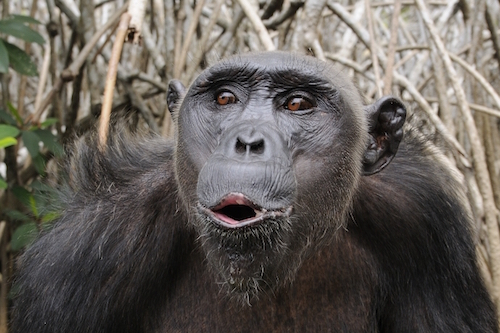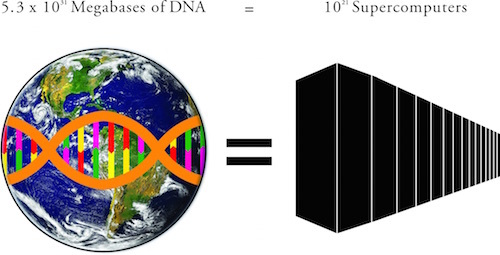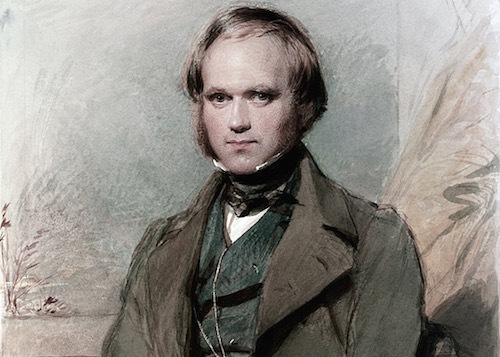Discovery Institute's Blog, page 150
June 30, 2015
Wishful Thinking: Chimps Know Right from Wrong

Here is another yearning attempt by the scientific community to elevate the capacities of animals to approach those of human beings. Last time, it was chimps can cook, but don't. This time, it is chimps that supposedly have now been shown to know the difference between right and wrong!
Except, they don't. Here's what the experiment on 17 zoo animals discovered. From the story in the Daily Mail:
The clips showed chimps either performing a neutral activity such as walking or cracking nuts, agg...
June 29, 2015
What's Behind the Compulsion to Compare Biological Systems to Designed Artifacts?

Our friend the Seattle radio host David Boze has been traveling in England and thought of us. He sent back some interesting holiday snaps. Here, for example, is the iconic Darwin portrait by John Collier at the National Portrait Gallery, followed by a caricature of Darwin showing a monkey its reflection in a mirror.


Note the caption under the second, "Darwin never claimed that humans had descended from apes but many contemporary caricatures played upon the idea."
David also visited the Oxf...
Could Seattle Be Your Destination? Work with Us at the Center for Science & Culture!

If you've ever wondered how you could contribute your talent and commitment to the intelligent design movement, here is your opportunity. Discovery Institute's Center for Science & Culture is expanding its team, adding two new staff positions in the area of development and fundraising.
Both positions will be based in our Seattle offices.
Here are some specifics. We're looking for a Development Data and Research Coordinator. See here for a detailed job description and an online application f...
Earth's Biosphere Is Awash in Information

Visualize an exoplanet far away: dynamic, comfortable, yet lifeless. It has water, plate tectonics, volcanoes, an atmosphere and all the ingredients for life -- but no life. What would be the primary factor distinguishing it from Earth? A new paper in PLOS Biology suggests that its chief drawback, all things being equal, would be a lack of complex specified information.
In this remarkable paper, Landenmark, Forgan, and Cockell of the United Kingdom Centre for Astrobiology at the University o...
June 28, 2015
Listen: More on the Law of Recurrent Variation, with Dr. Wolf-Ekkehard L��nnig

On a new episode of ID the Future, Casey Luskin again sits down with Dr. Wolf-Ekkehard Lnnig, a retired geneticist from the Max Planck Institute for Plant Breeding Research, to continue their talk on the law of recurrent variation and the problems it poses for Darwinian evolution.
In this segment, Dr. Lnnig describes how mutation breeding has largely stopped worldwide, even as belief and faith in accidental mutations as the basis for all life forms still flourishes. For the first part of th...
June 27, 2015
More on Alfred Wallace, the "Victorian Indiana Jones"

Yesterday, we noted plans for a Disney take on the early adult life of Charles Darwin, patterned on the exploits of a fictionalized Indiana Jones-type of figure. That is absurd, of course. Comparing Darwin to Indiana Jones has about all the believability of turning Clark Griswold into Ferdinand Magellan.
Alfred Russel Wallace, on the other hand, makes a quite plausible candidate for such heroic treatment. We've already recommended Michael Flannery's two books on the co-discoverer of evolutio...
June 26, 2015
A Disney Darwin Is Coming

There's already an element of the fairy tale in the beguiling Darwinian story of evolution, so perhaps a Disney Darwin isn't all that shocking an idea. It's evidently on the way, according to the Independent, "Charles Darwin Disney film: Adventure movie will give naturalist the Indiana Jones treatment."
Charles Darwin looks set to be given the Indiana Jones treatment after Disney bought the rights to an adventure film based on his life.
....
The Oscar-winning writer of Traffic, Stephen Gagha...
As a Solution to the Origin of Life, RNA World Model Comes Under Attack

According to a recent article at New Scientist, "Why 'RNA world' theory on origin of life may be wrong after all," the RNA world model of the origin of life is under attack:
Life has a chicken-and-egg problem: enzymes are needed to make nucleic acids -- the genetic material -- but to build them you need the genetic information contained in nucleic acids. So most researchers assume that the earliest life, long before the evolution of cells, consisted of RNA molecules. These contain genetic inf...
To Discover Irreducibly Complex Mechanisms, Biologists Reverse Engineer a Worm
My master's degree research focused on paleomagnetism and I've always been fascinated by the earth's magnetic field. So naturally I was interested in new research by biologists at the University of Texas, Austin, published in the journal eLife, "Magnetosensitive neurons mediate geomagnetic orientation in Caenorhabditis elegans." They explored how the nematode worm C. elegans (a favorite model organism for research) orients itself to the earth's magnetic field.
Many organisms have such an in...
June 25, 2015
Listen: Do Intelligent Design Scientists Do Research?

On a new episode of ID the Future, Nate Herbst and Casey Luskin talk about intelligent design research at Biologic Institute, where scientists are testing the cooption model of the evolution of new proteins.
Luskin notes that elsewhere in the academic world, many scientists are not currently free to discuss ID, including at public institutions. He highlights the case of Eric Hedin, a physics professor at Ball State University.
Discovery Institute's Blog
- Discovery Institute's profile
- 15 followers




